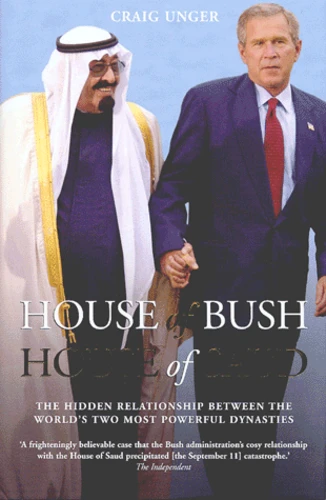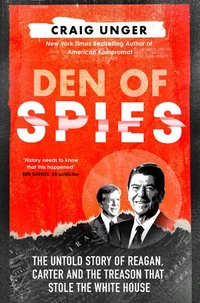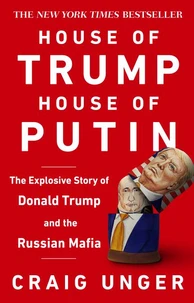House of Bush, House of Saud. The hidden relationship between the world's two most powerful dynasties
Par :Formats :
- Paiement en ligne :
- Livraison à domicile ou en point Mondial Relay indisponible
- Retrait Click and Collect en magasin gratuit
- Réservation en ligne avec paiement en magasin :
- Indisponible pour réserver et payer en magasin
- Nombre de pages356
- PrésentationRelié
- Poids0.71 kg
- Dimensions16,0 cm × 24,0 cm × 3,2 cm
- ISBN1-903933-58-7
- EAN9781903933589
- Date de parution01/01/2004
- ÉditeurGibson Square Books
Résumé
In House of Bush, House of Saud, Craig Unger presents a controversial and meticulously researched narrative countering official US explanations of Islamic terrorism. Revealing how the fortunes and public policies of President
George W. Bush, his father George H. W. Bush, and their associates, are connected with members of the ruling family of Saudi Arabia, Unger tells the politically explosive story of a thirty-year period of courtship, and how it fanned the rise of fundamentalist terrorism. Why did the Bush administration approve the secret airlift out of the U.S. of 140 Saudis, two days after 9/11 when American air traffic was all but shut down? Why were citizens of Saudi Arabia - a recognised hotbed for Islamic fundamentalism - given preferential visa-treatment when visiting the U.S.? Has the long-term relationship between the Bush family and the Saudis led them to compromise the fight against international terrorism? The answers lie in a relationship that began in the mid-1970s, when the oil-rich House of Saud set out for America in the wake of the OPEC oil embargo and soaring oil prices. Saudi Arabia needed American military protection and a place to invest its billions of petrodollars, and began prospecting among promising American politicians. With the Bushes, the Saudis bit a gusher: direct access to Presidents Ronald Reagan, George H. W. Bush, and George W. Bush, as well as to Secretary of State James Baker, Dick Cheney, Colin Powell and the entire
intelligence apparatus. What followed was an astonishing weave of influence, investment, and policy between the Bush family and the House of Saud that arcs straight into today's headlines. By the time George W. Bush was elected, the sum of at least $1.47 billion in investments and contracts from the Saudis had been channelled to the House of Bush in deals involving many companies - among them the Carlyle Group, an enormous, politically
connected private equity firm which also has ties with British politicians. In addition, ignored at the time, a secret strategy to win the Muslim-American vote actually played a key role in helping Bush win the controversial election of 2000. The revelations in this troubling, authoritatively researched account place the September 11 attacks, the two Iraq Wars, and the ongoing bombings by Al-Qaeda, and recent revelations from members of the Bush administration, in a startling new context that makes compulsive reading on the nature of politics in the U.S.
In House of Bush, House of Saud, Craig Unger presents a controversial and meticulously researched narrative countering official US explanations of Islamic terrorism. Revealing how the fortunes and public policies of President
George W. Bush, his father George H. W. Bush, and their associates, are connected with members of the ruling family of Saudi Arabia, Unger tells the politically explosive story of a thirty-year period of courtship, and how it fanned the rise of fundamentalist terrorism. Why did the Bush administration approve the secret airlift out of the U.S. of 140 Saudis, two days after 9/11 when American air traffic was all but shut down? Why were citizens of Saudi Arabia - a recognised hotbed for Islamic fundamentalism - given preferential visa-treatment when visiting the U.S.? Has the long-term relationship between the Bush family and the Saudis led them to compromise the fight against international terrorism? The answers lie in a relationship that began in the mid-1970s, when the oil-rich House of Saud set out for America in the wake of the OPEC oil embargo and soaring oil prices. Saudi Arabia needed American military protection and a place to invest its billions of petrodollars, and began prospecting among promising American politicians. With the Bushes, the Saudis bit a gusher: direct access to Presidents Ronald Reagan, George H. W. Bush, and George W. Bush, as well as to Secretary of State James Baker, Dick Cheney, Colin Powell and the entire
intelligence apparatus. What followed was an astonishing weave of influence, investment, and policy between the Bush family and the House of Saud that arcs straight into today's headlines. By the time George W. Bush was elected, the sum of at least $1.47 billion in investments and contracts from the Saudis had been channelled to the House of Bush in deals involving many companies - among them the Carlyle Group, an enormous, politically
connected private equity firm which also has ties with British politicians. In addition, ignored at the time, a secret strategy to win the Muslim-American vote actually played a key role in helping Bush win the controversial election of 2000. The revelations in this troubling, authoritatively researched account place the September 11 attacks, the two Iraq Wars, and the ongoing bombings by Al-Qaeda, and recent revelations from members of the Bush administration, in a startling new context that makes compulsive reading on the nature of politics in the U.S.




